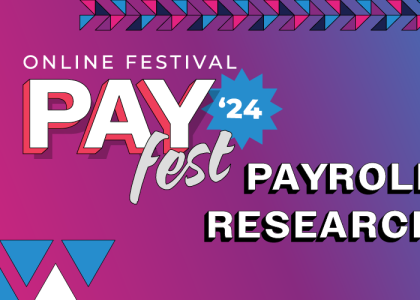Over half of payroll workers believe the industry needs greater investment to realise its full potential

In our latest payroll research report, we surveyed 400 payroll professionals across the UK and Ireland to find out what their current thoughts are on the industry, where their biggest challenges lay and what their career aspirations look like.
Mind the gap – is payroll facing a skills gap challenge?
When asked whether they plan to be working in payroll in five years’ time, 40% were unsure. The reasons were varied, with high levels of stress (34%), job security (31%) and lack of investment in individuals (22%) being the primary drivers for this. Retirement was also a considerable factor in the decision to leave.
And while 57% of people are excited about the future of And while 57% of people are excited about the future of payroll, they are concerned about their ability to embrace that future. 56% believe they need to learn new skills to take advantage of the innovation happening within the industry and only 4 in 10 comfortable with the pace of change.
Considering all these points, it’s not surprising that half of those we surveyed agreed that new talent needs attracting to work in payroll. However, of the 400 people we spoke to, none of them had started their payroll career in the 12 months previously, suggesting that attracting new talent isn’t happening in practice.
Payroll department misunderstood in organisations
We also discovered that more than half (56%) of all payroll workers believe greater investment is required in the sector, with 47% seeing untapped potential within the payroll function in their organisation.
And while half the people we spoke to told us they see the payroll function as being about more than simply making sure people get paid on time, 53% ultimately don’t believe their role has an impact on the reputation of their organisation.
Mistakes still happen and manual processes are rife
While investment in skills is crucial, data highlights that this will be futile unless organisations invest in the right technology too, with 38% still manually inputting data and 30% piecing data together from several different reports. This lack of investment is leading to errors, with 89% of payroll workers stating there have been mistakes in the past 12 months which have led to late or incorrect payments.
The technology impacting payroll departments is changing. We found that in the last five years, self-service capabilities and real time information are seen to be the most transformative. Over the next five years, it’s expected that artificial intelligence and automation will take the reins – which could suggest we’ll see those error-prone manual processes reduce in frequency and impact.
What businesses should do to act
Our data is clear - it’s time for organisations to act when it comes to supporting their payroll workers. The arrival of new technology has the potential to make a career in payroll more rewarding and productive, opening diverse and exciting career opportunities. However, this won’t happen by accident, and organisations must support employees, invest in their skills and development, and champion the function to ensure its potential is realised.
As this year’s National Payroll Week theme underlines, there are exciting career opportunities for those who choose payroll. To make this a reality, organisations must innovate their payroll function, maximising the opportunity new technology such as artificial intelligence brings to empower workers, increase accuracy and attract new talent into the industry.
Our latest Payroll Research Report has been released as part of PayFest, our online festival to mark the CIPP’s National Payroll Week with a calendar of webinars discussing financial wellbeing, real-time payroll and migrating your payroll with impact. More information on how you can take part can be found here.



